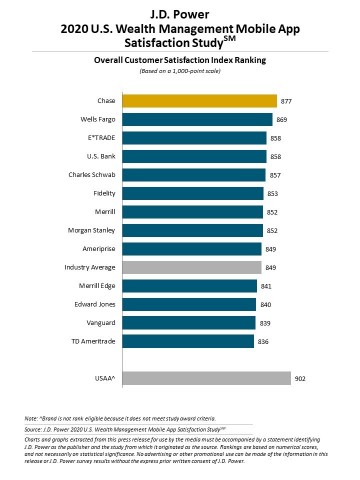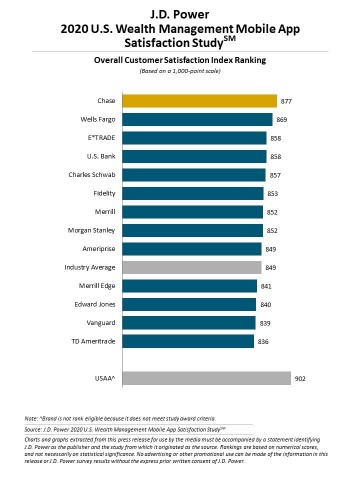TROY, Mich.--(BUSINESS WIRE)--Wealth management mobile apps have emerged as a go-to resource for investors during the COVID-19 pandemic, but despite substantial growth in app utilization, customer satisfaction lags other industries and firms have failed to leverage the potential of these digital tools to drive greater interaction with advisors. According to the J.D. Power 2020 U.S. Wealth Management Mobile App Satisfaction StudySM, released today, customer satisfaction with wealth mobile apps lags those provided by other consumer financial institutions such as credit card companies, retail banks and insurance companies, as few wealth management apps provide the level of advisor interaction customers are seeking.
“This is such a critical moment in the digital transformation of wealth management, and firms have a tremendous opportunity to leverage their mobile apps as a powerful communications conduit between investors and advisors,” said Michael Foy, senior director of wealth & lending intelligence at J.D. Power. “But most wealth app offerings are missing the mark. It’s notable that more than one-third of investors who work with an advisor say they’ve increased their wealth app usage during the pandemic, which is more than double the rate among investors in the do-it-yourself segment. Advisors and their firms need to recognize that the mobile app is not a threat to the advisor’s value—it is an opportunity to increase engagement by meeting investors where they are.”
Following are key findings of the 2020 study:
- Wealth management app use climbs during pandemic: Across both do-it-yourself (DIY)1 and advised investors, 33% say they’ve used their wealth management firm’s mobile app more frequently during the COVID-19 pandemic. Among those with advisors, 36% say usage has increased vs. 17% among DIY investors. Younger investors have led the trend, with 45% of Millennial2 investors and 30% of Gen X investors saying they have used wealth apps more frequently this year.
- Wealth app customer satisfaction lags other financial apps: Despite increased utilization, the overall satisfaction score for wealth apps is 849 (on a 1,000-point scale), which is lower than the overall satisfaction score for apps utilized in other segments of the financial services industry, such as credit card (865), insurance (864) and banking (852).
- Missed advisor engagement opportunity: During the height of the COVID-19 pandemic (May and June 2020), 31% of investors said they had no recent advisor contact. Among those who did communicate with advisors, just 2% said communication occurred via mobile app or secure messaging. Advisor contact via the app is low industry-wide, as only 35% of profiled wealth apps offer chat functionality and just 41% support secure messaging, despite both being frequently requested features by users.
- Advisor interaction via app drives customer satisfaction: Providing mobile features that support advisor engagement not only affects satisfaction with the app itself, but also affects overall investor satisfaction and loyalty to their wealth management firm. According to the J.D. Power 2020 U.S. Full-Service Investor Satisfaction Study,SM overall satisfaction among full-service investors who interact with their advisors via the wealth management firm’s mobile app is 40 points higher than among those who do not.
“No industry is immune to the consumer shift toward mobile apps, as usage continues to increase across the board,” said Amit Aggarwal, senior director of digital solutions at J.D. Power. “Wealth management firms need to recognize that the app is increasingly becoming their front door. Accordingly, they need to spend the time making sure that this channel is addressing customer needs, easy to navigate and seamlessly integrated into all facets of their business.”
The 2020 U.S. Wealth Management Mobile App Satisfaction Study evaluates customer satisfaction with wealth management mobile apps based on five factors (in order of importance): range of services; clarity of information; ease of navigating; appearance; and speed of screens loading. The study is based on responses from 2,724 full-service and self-directed wealth management firm customers and was fielded in July-August 2020.
Study Ranking
Chase ranks highest in overall customer satisfaction with wealth management apps, with a score of 877. Wells Fargo (869) ranks second, while E*TRADE (858) and U.S. Bank (858) rank third in a tie.
For more information about the U.S. Wealth Management Mobile App Satisfaction Study, visit https://www.jdpower.com/business/financial-services/us-wealth-management-mobile-app-satisfaction-study.
To view the online press release, please visit http://www.jdpower.com/pr-id/2020162.
J.D. Power is a global leader in consumer insights, advisory services and data and analytics. A pioneer in the use of big data, artificial intelligence (AI) and algorithmic modeling capabilities to understand consumer behavior, J.D. Power has been delivering incisive industry intelligence on customer interactions with brands and products for more than 50 years. The world's leading businesses across major industries rely on J.D. Power to guide their customer-facing strategies.
J.D. Power is headquartered in Troy, Mich., and has offices in North America, Europe and Asia Pacific. To learn more about the company’s business offerings, visit JDPower.com/business. The J.D. Power auto shopping tool can be found at JDPower.com.
About J.D. Power and Advertising/Promotional Rules: www.jdpower.com/business/about-us/press-release-info
1 J.D. Power defines DIY investors as those who have no advisor interaction with the primary investment firm.
2 J.D. Power defines generational groups as Pre-Boomers (born before 1946); Boomers (1946-1964); Gen X (1965-1976); Gen Y (1977-1994); and Gen Z (1995-2004). Millennials (1982-1994) are a subset of Gen Y.




